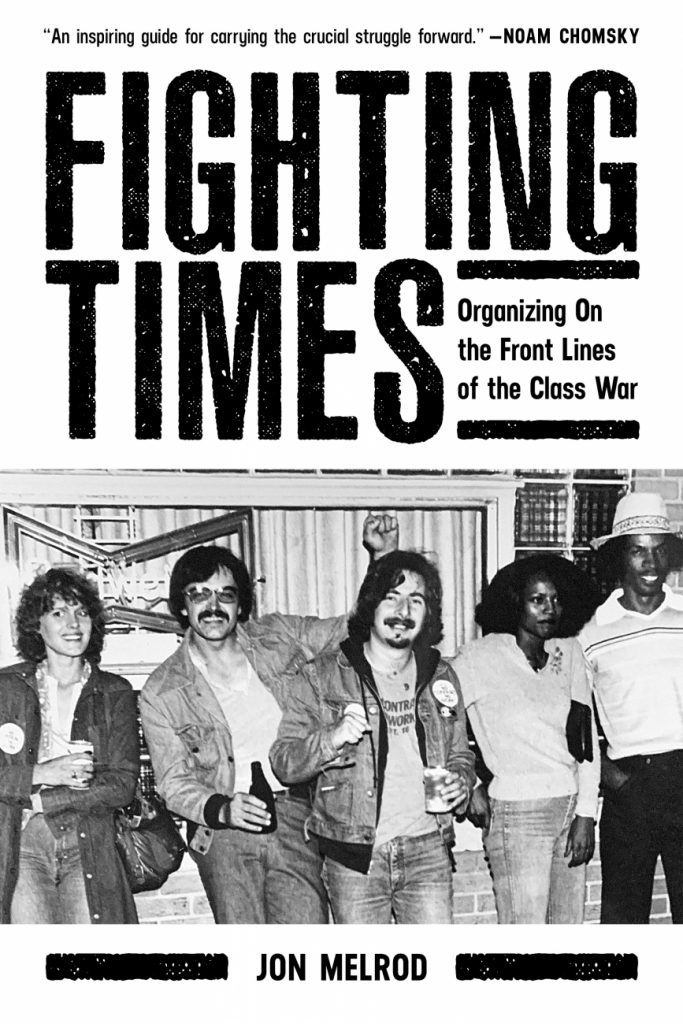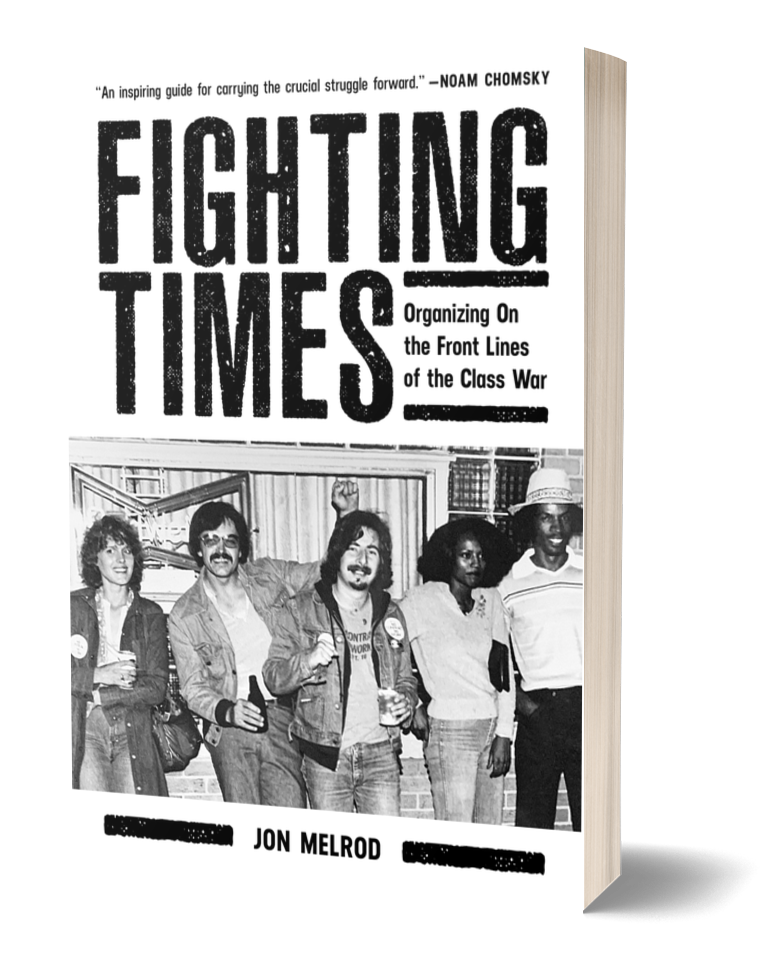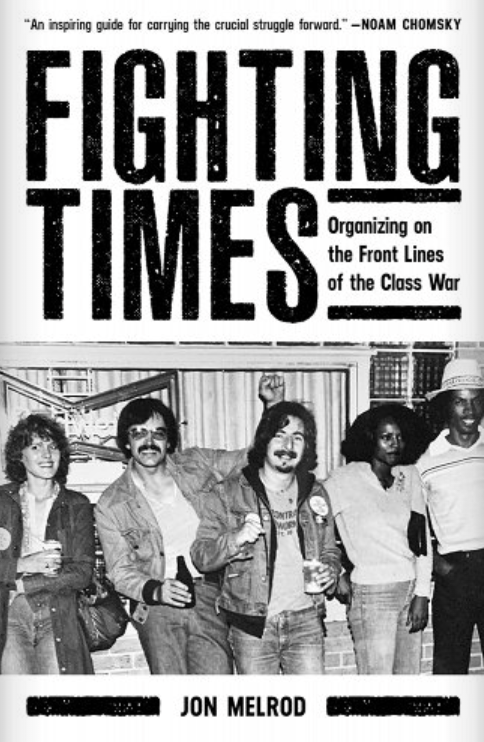“Mark my words, motherfucker: You’ll see me again.”
That’s what Jon Melrod snarled after being lifted up by two burly American Motors Corporation plant guards, with his feet flailing in the air and unable to reach the floor, and then ignominiously deposited on the sidewalk outside the 10,000-worker AMC plant in Milwaukee. For anyone watching on that day in 1973, it was a ritual humiliation.
But Melrod lived up to his word: America Motors was to see Melrod again and again and again, as recounted in his extraordinary, gripping Fighting Times: Organizing on the Front Lines of the Class War. Fighting Times tells the story of an indefatigable and inventive organizer for working people, and is filled with memorable moments. Melrod, after the tumultuous student rebellions of the late 1960s and 70s, was one of many leftists who viewed themselves as Marxist-Leninists leaving the campus and heading for the factory to radicalize workers.
Through most of s adult life, Melrod found himself at the forefront of both shop-floor battles and wider struggles for a socialist society. He organized active caucuses of rebellious young workers—with a major representation of Blacks, women, and Vietnam vets—that would confront management authority, and also push the United Auto Workers in a more democratic and militant direction.
The battle over his firing in 1973 was only the first of seven major legal battles where he and his allies defeated American Motors.
The National Labor Relations Board took over 1,000 days to rule on Melrod’s contention that he was fired for legitimate union activity protesting speedups, and the firing over his application omission was a transparent pretext for illegal punishment. But the wait proved worthwhile. The NLRB’s ruling: AMC must give Melrod back his job, provide him with 2 ½ years of back pay, and desist from harassing him for legally-protected union activity. Melrod showed his well-known flair for the dramatic when he returned to the plant holding aloft a giant copy of his back-pay check, eliciting applause and cheers from his fellow workers.
After transferring from about-to-be-closed Milwaukee plant (since leveled and replaced by a Wal-Mart with abysmal wages) to Kenosha, Melrod kept up his organizing. He soon connected with other young workers resentful of management’s wielding of authority and frustrated with what they saw as too feeble a response from the leaders of United Auto Workers 72.
UAW Local 72 had been founded by militant workers, mostly on the Left, who were unintimidated by the Nash Auto owner Charles Nash, who threatened to throw the keys to the plant into nearby Lake Michigan before he would bargain with the union. (Nash would later become part of American Motors). But worker pressure forced union recognition from Nash, and the feisty union staged what is believed to be the first sit-down strike in the auto industry in 1933.
Local 72 also won three key contract provisions that gave workers a degree of control not seen in the Big 3 and would later be used by Melrod and his caucus members. First, overtime was voluntary. Second, the union retained the right to strike over serious grievances involving the contract. Third, the union would be entitled to one steward for every 35 workers, as opposed to a 1-250 ratio in the Big 3.
These provisions offered the newly-formed United Workers Caucus important leverage in dealing with issues like speedup. The caucus met regularly to discuss conditions in the plant, and gave out a steady stream of leaflets expressing workers’ concerns. Eventually, the UW Caucus started growing and gaining a degree of influence.
That did not mean that Melrod and his colleagues were universally appreciated for shaking up the status quo. But Caucus members started to move up the union hierarchy as they won elections.
But Melrod—with his openly Left politics and the focus of so much management attention—remained a target from some unionists. In one bizarre incident, Melrod found himself in a bar so packed that it took him a moment to realize that a neighboring drinker—an actual Nazi Party member—had surreptitiously stuck a gun into his “commie Jew” ribs. Melrod scanned the bar, and saw that no one else could see what was happening in the jammed tavern. Melrod gulped, and it took a long night of drinking and fast talking by Melrod, which improbably ended with the Nazi embracing him as a “union brother.”
More lasting threats came from the top levels of American Motors. Never willing to let go of a vendetta, the management of AMC continued to be infuriated on an almost daily basis by the steady stream of leaflets emanating from Melrod and his colleagues. Managers’ fury soared to new levels when the United Workers Organization began publishing the Fighting Times newsletter. Fighting Times used each issue to spotlight a supervisor designated “scab of the month” for especially callous, racist, sexist, and authoritarian conduct.
Management came up with a new idea in 1983 to permanently silence Melrod and his co-editors John Drew and Tod Ohnstad. They lined up five supervisors who had been named “scab of the month. In a libel lawsuit financed by AMC, the company designed legal action claiming that the five had suffered various forms of mental distress, demanding $4.2 million in damages.
The Fighting Times 3 responded by lining up a team of capable labor attorneys and then doing some investigating on their ow for the trial in nearby Racine, a working-class town with a strong union presence. With the Fighting Times editors interviewing dozens of current and former AMC workers, they uncovered devastating testimony against the five.
One of the plaintiff supervisors was dropped from the lawsuit when he took the 5th Amendment when asked about his drug dealing. Another supervisor was dropped when his ex-girlfriend testified that he had literally torn apart her puppy with his bare hands. With one plaintiff after another confronted with testimony about their sordid deeds, only two plaintiffs remained.
Yet despite the proven accuracy of Fighting Times’ claims, the judge issued an extraordinary ruling: the Fightig Times 3 were guilty of libel. The only matter to be decided by the jury: the amount of damages. Appearing to reflect their own experiences with management, the jury found no damages for the plaintiffs.
In response, the NLRB acted relatively quickly. The Board found that AMC guilty of interfering with union rights. The ruling: $238,00 in legal fees for the defendants, plus their lost wages, and an order for American Motors to refrain from all harassment and interference with the union rights of the three defendants.
While making more of an impact following the victory, the 1980’s introduced a new level of class war. Rather than Charlie Nash threatening to throw his keys into the lake, America’s largest corporations began throwing entire plants over oceans. De-industrialization began hollowing out industrial communities like Kenosha, Racine and Milwaukee. There were sharp ups and downs in the auto industry, most deeply felt by AMC as the smallest of the four domestic automakers.
Melrod has moved on to a law practice in California, where his life-long political commitment is expressed in his work with political refugees.
Melrod’s Fighting Times is a gift to organizers on a wide variety of issues, with many lessons about tenacity, working with others with whom you disagree on some issues, and the willingness to take audacious steps in the hope others will follow.
Roger Bybee is a writer living in Wisconsin.








